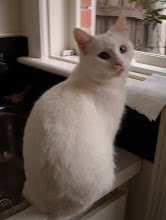
I started off on this journey with the avowed aim of exploring Web 2.0 particularly in relation to my private and public passion, local and family history. As I progressed through the course I was diverted into more general applications for Web 2.0 in libraries. I was familiar with a lot of the Web 2.0 tools but only as a passive user. E.g. I have been looking at other people's blogs, other people's MySpace accounts, Youtube, and other people's Flickr collections for ages. The key thing that the Learning 2.0 program did for me was make me become an active user, rather than a passive one.
However, as the course progressed I also became so much more aware of the huge number of possibilities out there. This course for me has definitely been the beginning of a journey. I feel that what I have done so far is like the tip of the iceberg. It will take me a long time to reach down underwater into the lowest crevices, particularly as parts will melt, and new bits will freeze up as time goes by.
What were the specific highlights for me?
- Bloglines is something that I am now using every day. It has been particularly interesting to use it to chart the progress of Boroondara staff in the Learning 2.0 course, but I also use it for a number of library and book related feeds and as well as for news links, ABC podcasts, new and programming links, and Flickr sites and friend's and family's blogs. I can't imagine not using Bloglines! Firefox makes it so simple to add to these feeds. You can find the link to my Bloglines on the side of this blog.
- Del.icio.us is another tool that I can not imagine not continuing to use. I am not at this stage using it to its fullest extent, but simply to keep track of my own tags. So there is room for further advances there. I was pretty cynical about Technorati when I first used it but have since found the need to use it, and have signed up and claimed my blog on it. I also installed the Technorati link on my blog so that people can add Hecuba's story to their favourites.
- Wikis also offered a range of prospects for use in public libraries and for local and family history. I had used Wikipedia for ages and am not in the least worried about the "unauthorized" nature of the information in it as some people are. However, I had not thought about using a wiki for a reference desk manual or creating my own wikis for various topics I am researching in local and family history. There is a lot of food for personal thought and action here.
- The web-based applications, such as Google docs and Zoho, seem a fabulous concept and I will explore them further. I have put up a biggish spreadsheet about Collingwood hotels and invited someone else to add material. At this point in time I must say that I think the software is a bit clunky, though the idea is a great one. Someone told me the other day that there is even a translation tool in Google docs - this would assist in getting feedback from people who read a range of languages.
- One exciting finding for me related to e-audiobooks and the implications for LOTE users. I was very excited to find Chinese, French, Portuguese and a multilingual site at a very cursory glance. Alas, Greek does not seem available. I did a search on Kazantzakis and came up with his work in many translations but none in the original.
- Other tools such as Librarything, Flickr, Facebook, MySpace, podcasts and Youtube were useful and fun but not things that were unfamiliar to me, except in that I had not previously joined them.
The real issue is where to now? I know for myself what my learnings are and I can identify tasks that I need to pursue. What I am really interested in at this point is the "where to now" of this Victorian Public Libraries Learning 2.0 program. I hope that the course blog will stay up and that our staff can continue to access the training after next Monday. I am sure that Boroondara will have some staff who have not quite finished and who would like to continue. I am very happy to take over registering their blogs and doing the staff tracking. I am sure that other staff, particularly those who have been mentors, would also be happy to help with the monitoring.
Now that the program has been set up, I would also like to encourage into the program other Boroondara staff who for whatever reason could not participate within the existing time-frames or parameters. Some of this course could easily be incorporated into our induction program, and it would also be useful if staff could just access particular modules. E.g. when we are working on developing podcasts, it will be useful for staff who have done Learning 2.0 to go back to that module as a refresher and for staff who have not done the course to do that module. There are many ways that we can use this program in Victorian public libraries in the future.





